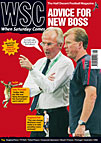 Brazil travelled to Germany as favourites, but Ronaldo, Ronaldinho and friends rarely looked worth the hype. As Robert Shaw explains, they paid the price for putting commercial concerns ahead of football
Brazil travelled to Germany as favourites, but Ronaldo, Ronaldinho and friends rarely looked worth the hype. As Robert Shaw explains, they paid the price for putting commercial concerns ahead of football
Carlos Alberto Parreira is an articulate coach, accustomed to giving presentations. But when it really mattered at the World Cup he was strangely speechless. After Thierry Henry slipped past a sleeping defence, Parreira seemed dumbstruck and delayed shuffling his pack, with Robinho left on the bench until it was too late. Brazil’s formation based on an attacking quartet was set in stone, although the notoriously cautious coach had only really seen it work well against Argentina in the Confederations Cup final last June and in the drubbing of Chile in September.
Parreira was perhaps seeking redress from critics who dismissed his 1994 winning side’s futébol de resultados as a betrayal of Brazilian traditions redeemed only by the sparkling Bebeto-Romario duo. Goalkeeper Marcos and striker Ricardo Oliveira were barred from the 2006 squad on fitness grounds by Parreira, who had overseen the 1970 squad’s training programme. But he also gave the nod to three players ill-equipped for Brazil’s campaign. A knee injury would rule out Edmilson, while the leaden-footed Adriano seemed distracted by his poor season with Inter – he refused to talk to the press completely after being dropped against Japan. Meanwhile, many marvelled that the No 9 shirt could still fit Ronaldo.
His FIFA profile claimed that he weighed 82kg, while he was actually waddling along at 95kg with the “neck of Mike Tyson” and feet crushed by new boots. As broadcaster Armando Nogueira noted: “It’s all very well this talk of patience and allowing Ronaldo to establish match fitness. But at the rate he is going he won’t even be ready for the 2010 World Cup.” While Kaka called for more mobility up front, 180 million of his compatriots wondered at the absence of lighter, nippier strikers such as Nilmar, currently with Corinthians on loan from Lyon, and why Fred should have been benched after his goal against Japan. Parreira scoffed at experimentation, but curiously some of those granted preservation orders also figured most prominently in sponsors’ ad campaigns.
In defeat the coaching staff recognised that perhaps they could have done with more friendlies. While Italy played Germany in the build-up, Brazil’s official friendlies since September 2005 were with Russia and the United Arab Emirates, the latter an 8-0 win and an even more convincing triumph for commercial imperatives. Business boomed at Weggis in Switzerland, with tickets being sold to watch training in what became known as the “Brazilian village”, but the cool Alpine conditions could have been replicated in the squad’s Teresopolis mountain retreat near Rio with less circus. Training methods were questioned with Tostão, the 1970 striker who is now a columnist, criticising “the daily sessions with players out of position and on a reduced sized pitch. This has nothing to do with a real match situation. In 40 days Brazil never trained with the tactical scheme they used against France.” He also slammed the squad: “Differently from the 1982 side, which also had many stars but lost, this World Cup team will not be missed at all.”
The predominantly sycophantic mood prevalent among the accompanying Brazilian media army was offset by a big bust-up over the lip-reading of Parreira. A team of deaf students was recruited by TV Globo programme Fantástico to interpret Parreira during the Japan game – they duly spotted more expletives than tactical observations and some acerbic comments on the relative merits of Emerson and Gilberto Silva. Although many found it the most innovative item in the wall-to-wall coverage, it prompted a mini-crisis at the TV network and a bristling Parreira refused to accept a fawning apology. There were other media own goals. After the Japan game Ronaldo and Roberto Carlos were interviewed live for a nightly TV programme, which meant staying up till after 1.30am. Despite a five-hour time difference, many Brazilians were asleep before the interviewees that night.
In the light of defeat there was the usual talk of “mercenaries” and players not feeling passionate enough about wearing the shirt, of individual records prioritised over team-building. However, those hoping for the emergence of a new Brazil could be frustrated. While Cafu’s father says he expect to watch the next World Cup with his son on the sofa, the full-back has only just stopped short of making himself available for all World Cups for the rest of his life. The emaciated assistant coach Mario Zagallo, now 74, wants to cling on at the Brazilian Football Federation (CBF) amid astonishing rumours he could act as a caretaker manager. With many players heading for hideaways and the CBF trying to erase references to the World Cup from their official website, it seems that Brazilians are trying to forget the World Cup. But the best cure of all? More football, of course. The national championship will now seamlessly resume its season, ten games into a 46-match programme.
From WSC 234 August 2006. What was happening this month